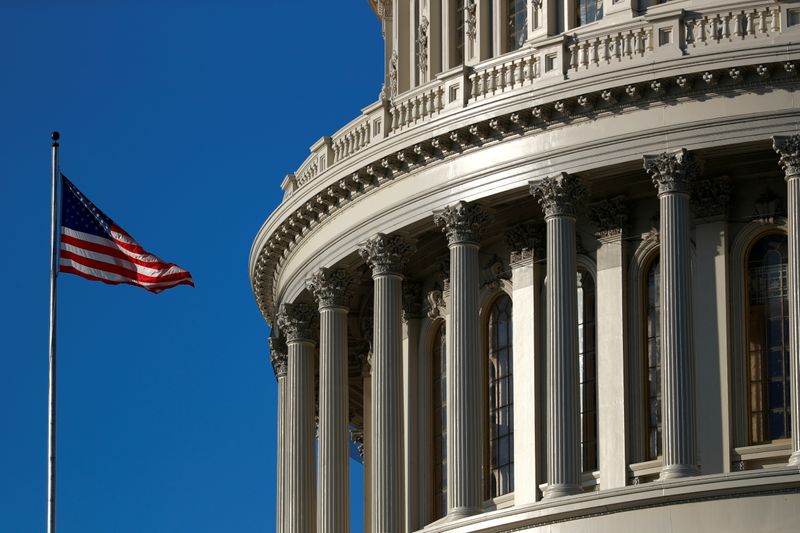By Richard Cowan
WASHINGTON (Reuters) -Top Democrats in the U.S. Congress on Monday said they would aim to continue funding the government and increase its borrowing authority in a single bill in coming days, setting up a showdown with Republicans who have vowed not to approve more debt.
House of Representatives Speaker Nancy Pelosi and Senate Majority Leader Chuck Schumer said the bill, which must pass by Oct. 1 to avoid the third partial government shutdown in the past decade, would also suspend the nation's borrowing limit until after the 2022 elections that will determine which party controls Congress.
Senate Republicans oppose any increase in federal borrowing authority. Both Schumer and Senate Republican Leader Mitch McConnell used the word "catastrophic" to describe potential economic and financial fallout of a failure to raise the limit, yet McConnell has said Republicans would not support raising the limit without spending cuts.
No. 2 Senate Democrat Dick Durbin told reporters he was worried over the possibility of an historic U.S. debt default.
"I know Senator McConnell, when he makes these pronouncements, has the tendency to ignore the consequences," Durbin said.
Schumer and Pelosi said in a statement the temporary government funding would extend through Dec. 31, giving lawmakers more time to pass appropriations bills running through Sept. 30, 2022.
The measure also would provide money to address recent natural disasters, including flooding and wildfires in many regions of the United States. It also would contain money to help resettle recent Afghan evacuees.
With the debt limit battle possibly preventing the multi-pronged bill from passing, some experts have raised hopes a stand-alone debt limit bill could be crafted, perhaps winning Republican support with future deficit-reduction steps or restructuring of the debt limit.
Democratic Senator Patrick Leahy, who chairs the Senate Appropriations Committee with oversight of government spending, told reporters that with 60 of 100 votes were needed in that chamber to advance legislation and with Republicans in opposition, there likely are not the votes to pass the combined measures.
"I'm not sure what's going to happen," Leahy said.
'BIPARTISAN RESPONSIBILITY'
Republicans did not appear to have agreed on how they would respond to the combined legislation.
Republican Senator John Kennedy, from the hurricane-stricken state of Louisiana, said he likely would vote for a combined government funding/debt relief measure if it included disaster relief.
But Kennedy predicted such a measure would fail to get enough Republican support to clear a procedural vote, saying a combined bill "is going to go down like a fat guy on a seesaw.”
Republican Senator Chuck Grassley said his party could avoid blame for a failed vote on the debt ceiling and government funding, if Democrats requested unanimous consent to pass the measures with a simple majority vote, skipping the procedural step that requires a supermajority of 60 votes.
“Republicans don’t want to shut down the government. So just move ahead with 50 votes. You don’t have to have 60 votes,” Grassley told reporters.
Democrats so far have rebuffed McConnell's suggestion that the debt limit be passed through a budget reconciliation bill that Democrats would pass without Republican support under a special procedure.
They insist that the debt limit increase should remain a bipartisan effort.
"Anyone who says this is Democrats' debt is not talking fact, they're talking fiction. Both sides have a responsibility to pay for the debt we've already incurred," Schumer told the Senate.
President Joe Biden voiced support for the Democrats' strategy.
"This is a bipartisan responsibility, just as it was under my predecessor," Biden said on Twitter (NYSE:TWTR). "Blocking it would be inexcusable."
After Schumer spoke, McConnell reiterated his opposition to raising the debt limit.
"Since Democrats decided to go it alone they will not get Republicans' help in raising the debt limit," McConnell said. He was referring to Biden's $3.5 trillion domestic investment program that Democrats aim to pass over Republican objections through reconciliation.

Democrats supported debt limit increases three times during Republican President Donald Trump's administration.
The current debt ceiling is $28.4 trillion.